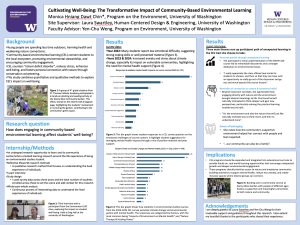Cultivating Well-Being: The Transformative Impact of Community-Based Environmental Learning
Community-based environmental learning (CEL) is a learning opportunity that encourages personal development and fosters a connection between students and their environment. However, little is known about the effects of CEL on students’ wellbeing. This study explores how CEL programs impact students’ emotional resilience and mental health, focusing on how time in nature reduces anxiety and strengthens community connections. In-depth interviews and surveys were carried out using a phenomenological research approach to examine students’ lived experiences, including a case study of a participant in the Danny Woo Community Garden. A whole-part-whole method was used to analyze the interview data, and the results revealed three main themes: Personal growth through unexpected learning, reminder of connection to nature & emotional relief, and sense of belonging. To give a more comprehensive background, anonymous survey data of a cohort of the CEL participant’s peers who also engaged in CEL were analyzed. A key finding was the participant’s realization that focusing on the needs of others through community service helped reduce her anxiety and perfectionism. She described how engagement with the garden allowed her to decenter herself, shifting focus from self-centered concerns to the well-being of the community, which ultimately improved her mental health. Contributing to a larger cause helped her feel grounded and balanced, showing how CEL fosters mental well-being through connection and purpose. Survey results confirmed these qualitative insights, showing that CEL reduces stress and enhances emotional health while promoting a stronger sense of purpose.
